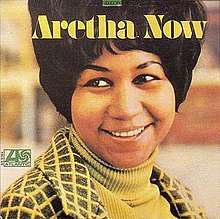Aretha Now
Aretha Now is the thirteenth studio album by American singer Aretha Franklin, released on June 14, 1968, by Atlantic Records. The album is gold-certified. It reached No. 3 on Billboard's album chart. In 1993, this album was reissued on CD through Rhino Records[1]. The album was rated the 133rd best album of the 1960s by Pitchfork.[2]
| Review scores | |
|---|---|
| Source | Rating |
| Allmusic | |
| Rolling Stone | (negative) [3] |
| Encyclopedia of Popular Music | |
| Aretha Now | ||||
|---|---|---|---|---|
 | ||||
| Studio album by | ||||
| Released | June 14, 1968[1] | |||
| Recorded | December 1967 – April 1968[1] | |||
| Studio | Atlantic Studios, (New York City, New York) | |||
| Genre | Deep soul, Southern soul, soul, R&B | |||
| Length | 29:30 | |||
| Label | Atlantic (#8186) | |||
| Producer | Jerry Wexler | |||
| Aretha Franklin chronology | ||||
| ||||
| Singles from Aretha Now | ||||
| ||||
Track listing
Information is based on the album’s Liner Notes[1][5]
| No. | Title | Writer(s) | Length |
|---|---|---|---|
| 1. | "Think" | Aretha Franklin, Ted White | 2:19 |
| 2. | "I Say a Little Prayer" | Burt Bacharach, Hal David | 3:36 |
| 3. | "See Saw" | Don Covay, Steve Cropper | 2:46 |
| 4. | "Night Time Is the Right Time" | Lew Herman | 4:50 |
| 5. | "You Send Me" | Sam Cooke | 2:29 |
| No. | Title | Writer(s) | Length |
|---|---|---|---|
| 6. | "You're a Sweet Sweet Man" | Ronnie Shannon | 2:19 |
| 7. | "I Take What I Want" | Isaac Hayes, Mabon "Teenie" Hodges, David Porter | 2:33 |
| 8. | "Hello Sunshine" | Jimmy Cliff, King Curtis, Ronnie Miller | 3:03 |
| 9. | "A Change" | Dorian Burton, Clyde Otis | 2:27 |
| 10. | "I Can't See Myself Leaving You" | Shannon | 3:01 |
Personnel
Information is based on the album’s Liner Notes[1][5]
- Aretha Franklin – lead vocals (all), piano (1-5, 7, 10)
- Tommy Cogbill – guitar (1-3, 10), bass guitar (6, 8-9)
- Carolyn Franklin – background vocals (6, 8-9)
- Roger Hawkins – drums (all)
- Jerry Jemmott – bass guitar (1-5, 7, 10)
- Jimmy Johnson – guitar (1, 3, 5-6, 8-10)
- Spooner Oldham – Hammond organ (1, 5), electric piano (3, 6-7, 10), piano (8)
- The Sweet Inspirations – background vocals (all)
- Bobby Womack – guitar (6, 8-9)
- Horns:
- Floyd Newman – baritone saxophone
- Willie Bridges – baritone saxophone (1, 3-5, 7, 10)
- Charles Chalmers, Andrew Love – tenor saxophone
- King Curtis, Seldon Powell – tenor saxophone
- Bernie Glow, Wayne Jackson, Melvin Lastie, Joe Newman – trumpet
- Haywood Henry – baritone saxophone (6, 8)
- Tony Studd – bass trombone
- Frank Wess – tenor saxophone, flute
- All arrangements by Tom Dowd and Arif Mardin
- Tom Dowd – engineering
Charts
Billboard Music Charts (North America)
| Chart (1968) | Peak position |
|---|---|
| Pop Albums | 3 |
| R&B Albums | 1 |
| Jazz Albums | 9 |
gollark: They lose data if stored without power for a while, apparently.
gollark: Probably. I don't know if this is actually going to be any use, though.
gollark: I mean... arguably? Ish?
gollark: And some shell (probably two or more?) designed on the idea of passing around structured data objects instead of just text.
gollark: And a Python shell.
References
- Franklin, Aretha. “Aretha Now” (Remastered CD Liner Notes). Rhino. 1993.
- "The 200 Best Albums of the 1960s | Pitchfork". pitchfork.com. Retrieved 2017-08-22.
- Landau, Jon (July 5, 1968). "Aretha". Rolling Stone. Retrieved 22 August 2013.
- Larkin, Colin (2007). Encyclopedia of Popular Music (4th ed.). Oxford University Press. ISBN 978-0195313734.
- Franklin, Aretha. “Aretha Now” (Original Album Notes). Atlantic. 1968.
External links
This article is issued from Wikipedia. The text is licensed under Creative Commons - Attribution - Sharealike. Additional terms may apply for the media files.